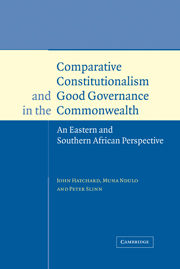 Comparative Constitutionalism and Good Governance in the Commonwealth
Comparative Constitutionalism and Good Governance in the Commonwealth Book contents
- Frontmatter
- Contents
- Preface
- List of cases
- List of constitutions
- List of statutes
- List of other instruments
- Map
- Introduction
- 1 The democratic state in Africa: setting the scene
- 2 Constitutions and the search for a viable political order
- 3 Devising popular and durable national constitutions: the new constitutions of the 1990s
- 4 Perfecting imperfections: amending a constitution
- 5 Presidentialism and restraints upon executive power
- 6 Enhancing access to the political system
- 7 Making legislatures effective
- 8 The judiciary and the protection of constitutional rights
- 9 The devolution of power to local communities
- 10 Developing autochthonous oversight bodies: human rights commissions and offices of the ombudsman
- 11 Seeking constitutional control of the military
- 12 Constitutionalism and emergency powers
- 13 Constitutional governance: the lessons from southern and eastern experience
- Bibliography
- Index
1 - The democratic state in Africa: setting the scene
Published online by Cambridge University Press: 23 June 2009
- Frontmatter
- Contents
- Preface
- List of cases
- List of constitutions
- List of statutes
- List of other instruments
- Map
- Introduction
- 1 The democratic state in Africa: setting the scene
- 2 Constitutions and the search for a viable political order
- 3 Devising popular and durable national constitutions: the new constitutions of the 1990s
- 4 Perfecting imperfections: amending a constitution
- 5 Presidentialism and restraints upon executive power
- 6 Enhancing access to the political system
- 7 Making legislatures effective
- 8 The judiciary and the protection of constitutional rights
- 9 The devolution of power to local communities
- 10 Developing autochthonous oversight bodies: human rights commissions and offices of the ombudsman
- 11 Seeking constitutional control of the military
- 12 Constitutionalism and emergency powers
- 13 Constitutional governance: the lessons from southern and eastern experience
- Bibliography
- Index
Summary
Setting the scene: Africa's record
It is appropriate to begin with some general reflections upon Africa's successes and failures in the field of governance since independence and upon the future of democracy on the continent in the new millennium. Africa, with a land area three times the size of the United States and a population in excess of 600 million people, is both the least developed and, in terms of natural resources, the most endowed continent in the world. With its vast mineral, oil, water, land and human resources, the continent has the ability to attain sustainable development, that is to say ‘increasingly productive employment opportunities and a steadily improving quality of life for all its citizens’. Yet millions of Africans live in acute poverty, have no access to safe drinking water and are illiterate. The ambiguity in Africa's position is revealed with particular clarity in relation to food production. In pre-colonial times, the continent was self-sufficient in this area. Now, however, many African countries are dependent upon external food supplies. On the face of it, the inability of the African continent to feed itself is paradoxical, since one of its chief assets is its huge agricultural potential. Further it has all the conditions for becoming one of the world's major food baskets.
Unfortunately, Africa lacks the domestic capital necessary to translate its enormous wealth into realisable benefits for its people and it has failed to attract sizable foreign investment to fill the gap.
- Type
- Chapter
- Information
- Comparative Constitutionalism and Good Governance in the CommonwealthAn Eastern and Southern African Perspective, pp. 5 - 11Publisher: Cambridge University PressPrint publication year: 2004


